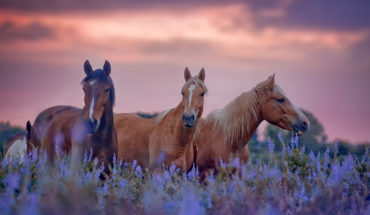Mustangs are pretty popular horse breeds owing to their status and rich as protected wild animals belonging to the American West. They can be adopted through organizations like International Society for the Protection of Mustangs and Burros. Owning a horse itself can be a major undertaking, but a greater challenge arises when dealing with a wild, untrained animal. However, with the proper knowledge and training, one would be able to care for their mustang effectively. With time, the mustang will also learn how to trust the person and become a loyal companion on the trail.
Wild horses like mustangs usually are much healthier than domesticated horses owing to their diet. They have a lot of variety to choose from when it comes to food. This includes seeds, berries, flowers, grasses and fruits. It provides the mustangs with all the nutrients their body might need. Once they leave their natural setting, they are likely to be fed hay mostly. Hay basically dead grass and hence does not contain all the vitamins needed in the diet of a horse. Hence steps have to be taken to fill the nutritional gaps. A comprehensive vitamin and mineral supplement along with a flaxseed meal for omega 3s should ideally be provided.
Mustang horses living in the wild rarely experience colic. One of the key reasons why colic develops when mustangs get domesticated is due to the rapid change from one feed to another, while providing bacterial hindgut population very little time to adjust. These microbes are responsible for digesting the fiber found in forage and have to be protected. To help the digestive system of a newly adopted mustang to adjust, one can feed them potent pro-biotic that contains billions of colony forming units (CFUs). Detailed information about what exactly a newly adopted mustang should be fed can be sought out through the volunteers of International Society for the Protection of Mustangs and Burros.
Ulcers are also quite common in domesticated horses particularly when they are transitioning to a new environment. Horses like mustang are like trickle feeders. They need to graze continuously for the purpose of keeping the digestive system functioning in a normal manner. This means that they must have quality hay throughout the day. Horses tend to stay awake and moving the majority of the time, and tend to take 15 to 20 minute naps intermittently throughout the day and night. The ideal way to protect a newly adopted mustang against an ulcer is to feed them in sync with their natural instinct to continuously graze by giving them hay, free-choice. A lot of mustangs tend to be young. They need a variety of feed sources that they had in the wild that provide quality vitamins, proteins, fats and minerals to support new growth. To accomplish some alfalfa must be added to the diet of the horse.




